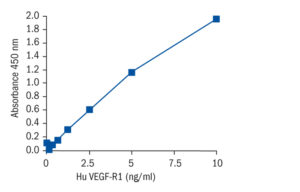sVEGF-R1/FLT-1 Human ELISA
Soluble VEGF-R1 (sFLT-1) is a naturally occurring endogenous form of the VEGF-R1 and was originally found in the supernatant of Human vascular endothelial cells. It is generated by differential splicing of the flt-1 gene. In vitro sVEGF-R1 is used to inhibit VEGF-A mediated signals in endothelial cells and in vivo it can be used to block physiological angiogenesis in several organs, e.g. in the ovary or in bones. Tumor cells transfected with the flt-1 gene are growth restricted in vivo because of the limitation in developing tumor blood vessels via VEGF-A signalling. Very recent studies have shown that this molecule is present endogenously at ng/ml concentrations in biologicals fluids of normal Human subjects or in the conditioned media of FLT-1 positive cell types. The measurement of sFLT-1 in a variety of clinical conditions may open up new insights in health and disease.
Characterization of angiogenic activity, such as embryonic development, placental vascularization, cancer and wound healing is measured by comparing the ratio of angiogenic stimulators (e.g. FGF-2, FGF-1, VEGF-A, Ang-1) to angiogenic inhibitors (e.g. sFLT-1, angiostatin, endostatin, thrombospondin). Several independently published data of both normal and pathogenic subjects have confirmed endogenous levels of VEGF-A and bFGF in pg/ml ranges. These factors have been thought to work unopposed to cause blood vessel formation. The finding that sVEGF-R1, a strong VEGF-A antagonist, is present in normal subjects suggests a finely tuned balance of signal transduction, the workings of which can now be explored. Together with other similar assay systems, positive and negative angiogenic regulators can now be explored in many different physiological and pathological settings using Human cell culture supernatants and biologicals fluids.
Research topic
Cytokines and chemokines and related molecules
Type
Sandwich ELISA, Biotin-labelled antibody
Applications
Serum, Plasma-EDTA, Plasma-Citrate, Cell culture supernatant
Sample Requirements
50 µl/well
Storage/Expiration
Store the complete kit at 2–8°C. Under these conditions, the kit is stable until the expiration date (see label on the box).
Calibration Curve

Calibration Range
0.16–10 ng/ml
Limit of Detection
0.03 ng/ml
Intra-assay (Within-Run)
CV = 5.1%
Inter-assay (Run-to-Run)
CV = 5.4%
Spiking Recovery
102,70%
Dilutation Linearity
102.8%.
– Loegl J, Nussbaumer E, Hiden U, Majali-Martinez A, Ghaffari-Tabrizi-Wizy N, Cvitic S, Lang I, Desoye G, Huppertz B. Pigment epithelium-derived factor (PEDF): a novel trophoblast-derived factor limiting feto-placental angiogenesis in late pregnancy. Angiogenesis. 2016 Jun 8;

